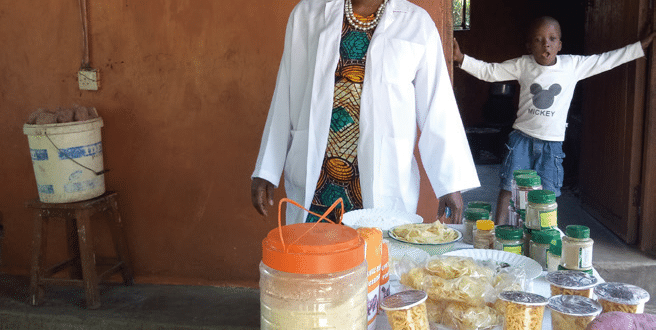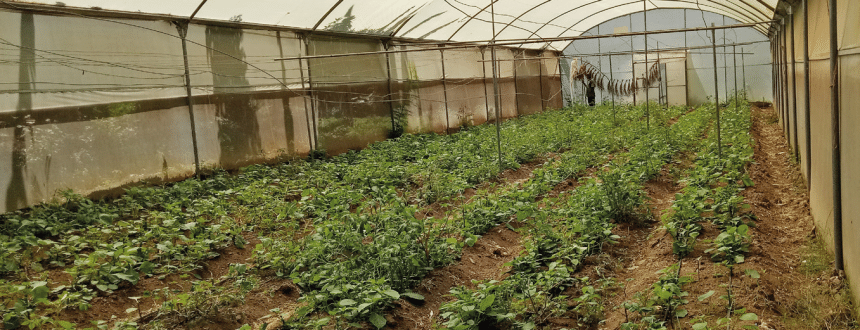Walking the talk: civil servant transforms rugged land into paradise
Their shamba is a prototype of Israel, a tiny Middle East nation, which through the use of good agricultural practices, regulations and scientific innovation, has metamorphosed into a global food basket.
Covered by a splash of greenery, a collection of ornamental flowers, and indigenous tree species, the farm, which stands on what was previously considered wasteland, is a sight to behold.
Mr and Mrs Wanyela are re-writing the history about farmers being poor and mapping a new path of efficiency and prosperity. While the neighbours sell their produce for a pittance, they are adding value to their produce and making good money.
“It was my childhood dream to have an efficient farm. I had technical skills and knowledge on farming and my husband helped me acquire and transform this wasteland into a paradise,” says Mrs Wanyela.
“The jagged and rocky 10-acre piece of land was prone to soil erosion and people thought we were out of our minds for purchasing it,” she recalls. The couple built their home and three years later to their dismay, vicious currents of water would sweep across their homestead, causing endless destruction.
They integrated soil erosion mitigation measures such as terracing (retention ditches, cut-off drains, and stone terracing), crop rotation, agroforestry (with a tree-cover), early planting, contour ploughing and planting. The interventions controlled the erosion, transforming the farm into a beautiful and productive venture.
“My husband is passionate about preserving trees and promoting agroforestry, especially indigenous species many of which are on the verge of extinction,” she explains.
In a nutshell, their enterprise can be best described as a mini-production plant (factory) dedicated to the value addition of selected food crops, herbal medicine production, and greenhouse production of cabbages, spider tomatoes, and spider plant (saga).
The value-addition
Plantain, ripe bananas, groundnuts, sweet potatoes, cassava, arrowroot s, maize, and soya beans are some of the crops to which she adds value.
s, maize, and soya beans are some of the crops to which she adds value.
“My passion for value addition and food processing was ignited after observing that farming has failed to salvage a majority of the locals from poverty primarily because they sell their produce at low farm gate prices and are exploited by middlemen,” she said.
“It’s ironical that whereas the cost of transporting products to the market in raw form is higher than that of processed products, for example, sweet potato crackles versus the tubers, local farmers still sell fresh produce at very low prices.”
She attributes her handsome profit to value addition. as Value-added products are more palatable than raw ones. Some of the steps she undertakes in making her products involve the following: sorting, cleaning, peeling, chopping, drying the potatoes, grinding into flour, blending and making dough and frying.
Unlike bakery products, confectionery, and pastries from factories, she does not add artificial additives and preservatives. This makes her products more marketable because they retain their original characteristics.
Some of her value-added products include Wholemeal porridge flour, which is made from ground millet, soya beans, maize flour, and dried sweet potato chips. Others are sweet potato crackles, boiled and mashed sweet potatoes, add to wheat flour at a 3:1 ratio. They retail under the brand ‘Mombozuma Enterprises Limited’.
“Potential value adders should base the decision, mainly on the relative cost of purchasing ingredients versus producing for themselves,” she advises fellow farmers.
Herbal medicine
 The farm is also home to a variety of herbal plants that are used as raw materials in the production of organic medicine. They include rosemary, rosella (Hibiscus plant), lemon grass, mucuna beans, and strawberries.
The farm is also home to a variety of herbal plants that are used as raw materials in the production of organic medicine. They include rosemary, rosella (Hibiscus plant), lemon grass, mucuna beans, and strawberries.
She also grows fruits such as pawpaws, and tree tomatoes, guavas. Living in a world where many people are suffering from one health complication or another, a situation aggravated by the
Covid-19 pandemic, folks are now more conscious about health matters. With that background, the Wanyelas enjoy a high demand for their products.
“My herbal products are in powder form and packed in 250-gram containers. They are good for the treatment, prevention, and management of diseases such as cancers, male and female reproductive health challenges, skeletal and digestive problems, diabetes, pressure, stroke, and skin issues,” adds Mrs Wanyela
Greenhouse production
 The farmer also grows cabbages, spider plants (saga), and tomatoes in her greenhouse with minimal use of agro-chemicals.
The farmer also grows cabbages, spider plants (saga), and tomatoes in her greenhouse with minimal use of agro-chemicals.
With proper phytosanitary measures, she notes, it is possible to raise non-conventional crops in the greenhouse with limited chemical use and under conservation agriculture, which promotes minimum soil disturbance. The Wanyelas test their soil annually since 2015, to determine its suitability for growing various crops.
Soils are then treated with manure and limed according to the pH requirement of targeted crops before planting. They also use clean treated planting material, free from pests and weeds.
Challenges
“Whitefly is the most stubborn pest, and bacterial wilt, early and late blight are some of the most notorious diseases that defy organic pest control measures,” says Mrs Wanyela.
To reduce the spread of pests and diseases, visitors must sanitise before accessing the greenhouses. Since the ban on the use of polythene bags, the prices of packaging containers such as aluminum foils and disposable cups has increased. Other times are unavailable.
Likewise, the 250g plastic containers for storing herbal medicine come from Nairobi, which increases the cost of production.
The farm also trains youth and women’s groups on food processing, conservation agriculture, and other aspects of agriculture under a government-sponsored programme, the Kenya Youth Empowerment Opportunities (KYEOP).
“Farmers and jobless youth should engage in value addition, to boost food security and their income. I appeal to the government to channel more funds and technical support to individual farmers and groups, but in particular the food processing and value addition chain,” she says.
ALSO READ: How to establish a passion fruit vineyard
ALSO READ: Achieving-success-in-dairy-production



